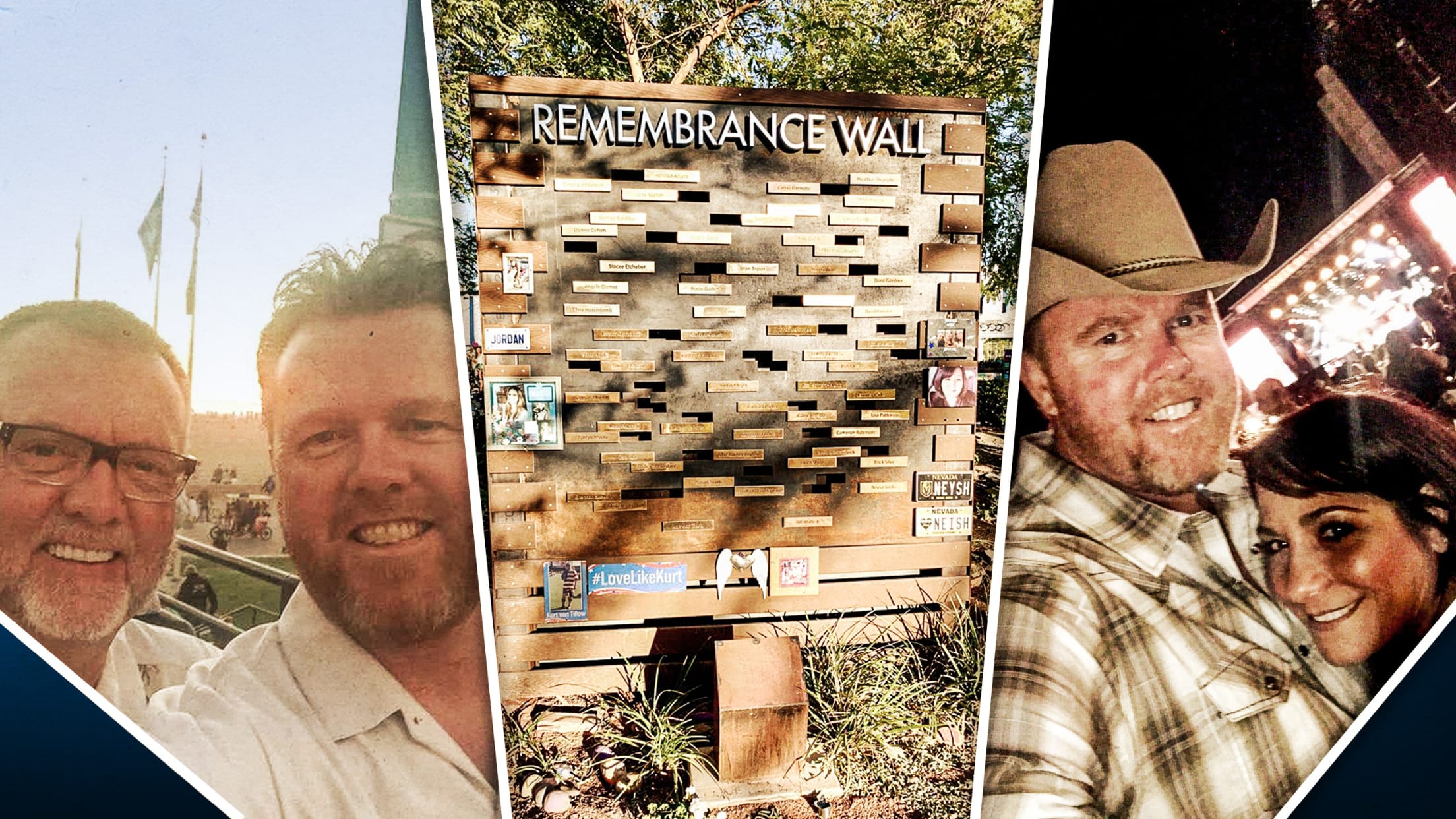
A HOFer's son saved lives, changed his own
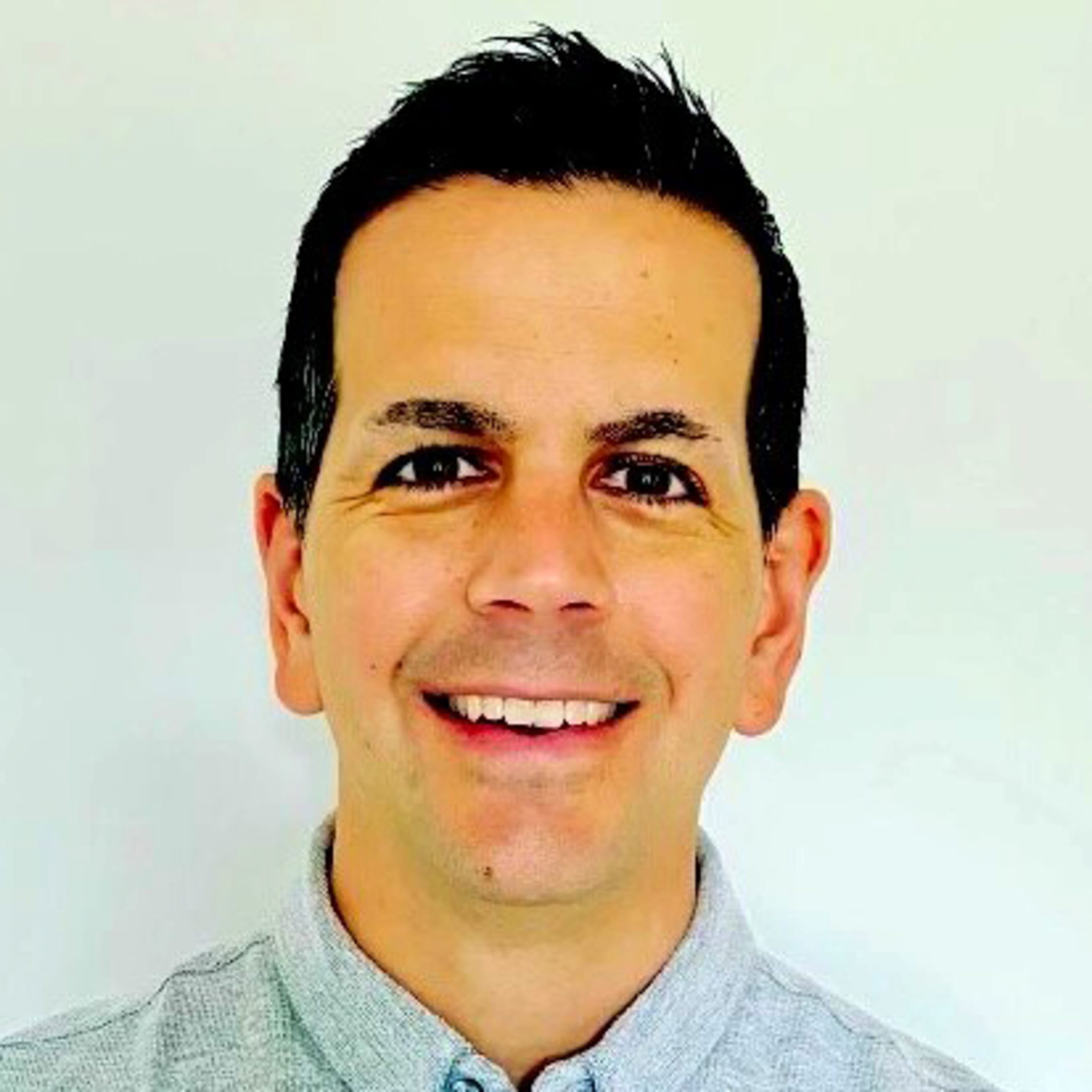
In the Three Rivers Stadium dugout, they gathered, yearning for spiritual insight and a baseball spark. It was mid-October 1979. The Pittsburgh Pirates were on the brink of elimination in the World Series, trailing the Baltimore Orioles three games to one, and their manager, Chuck Tanner, was mourning the death of his mother. So this weekly ritual of Sunday chapel service carried a deeper meaning for the squad that fashioned itself a family.
Todd Blyleven was a member of that family. The 7-year-old, red-haired, freckled son of Bert Blyleven served as the club’s bat boy and was affectionately known as “Tomato Face.” He had spent that season embedded with the Bucs, swinging on Dave Parker’s muscular arms and helping Willie Stargell hand out gold stars after victories to the players of the game. The boy sat amongst his older brethren and listened as the chaplain, a bearded Vietnam veteran in a polo shirt, gave the players a prayerful pump-up speech centered around the biblical tale of David and Goliath.
“If you pull together, if you work as a team” the man said, “you can overcome the odds.”
The message centered on selflessness had resonance that night, when the Pirates’ bats awoke in the late innings and Bert, on two days’ rest after his Game 2 start, tossed four scoreless innings of relief to secure a 7-1 victory. And it continued to serve as a guiding light when the “We Are Family” Bucs won Games 6 and 7 in Baltimore to capture the crown.
As is usually the case in the transient world of professional sports, the members of the ’79 Pirates drifted apart in the ensuing years. Blyleven and his confounding curveball went on to Cleveland, to Minnesota and to Anaheim, and young Todd followed his father to different fields and different families.
Yet something about that chapel service and that message always stuck with Todd. The idea of trudging through difficulty became vital to him in his own baseball career, as he struggled to live up to the standard set by his Hall of Fame father. It became important in his personal life when emotional conflicts threatened his marriage.
And the message mattered most when Todd needed it most -- on the night of the deadliest mass shooting in modern American history.
That was the night Todd Blyleven helped save a lot of lives.
Including his own.
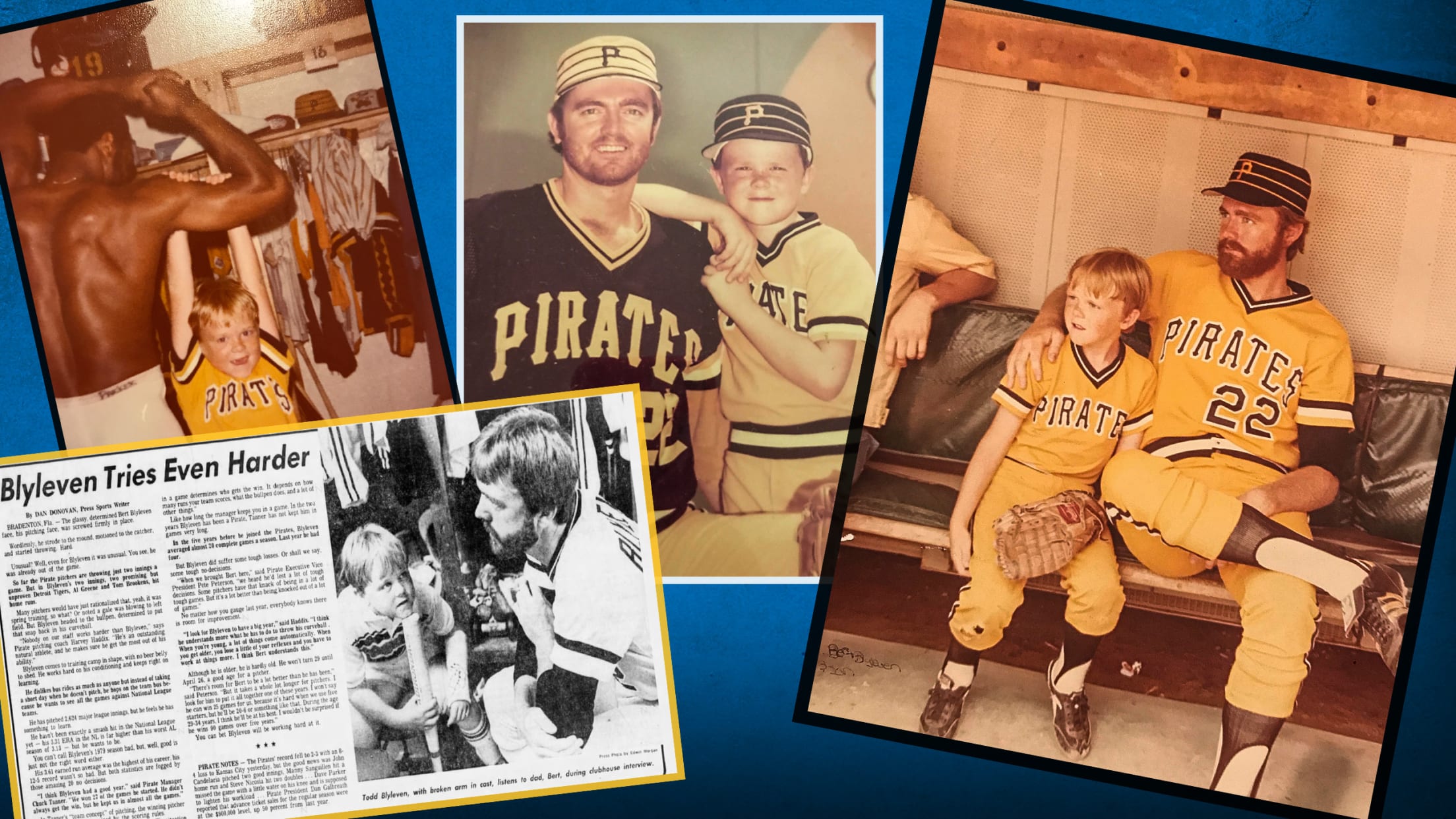
“Dad!” the son said, huffing. “Aren’t we going to stop?”
The boy grew up pursuing his father’s footsteps. When he was especially young, he’d trail him on his bike, pumping his legs as he ascended the hilly roads of their neighborhood in Villa Park, Calif. Then, as he grew, he began jogging alongside him, molding himself into a fine distance runner.
But this day was hot as hell, the street especially steep. The son wanted to take a break.
“There’s no stopping here,” the dad replied. “There are people that want my job.”
This was Bert Blyleven’s familiar refrain. Born Rik Aalbert Blijleven in Zeist, Netherlands, in 1951, he was the third child of Johannes Cornelius and Jannigje Blijleven, who had married when the country was still under Nazi occupation. His parents fled war-torn Europe in 1954, looking for a better life -- first in Saskatchewan, where farm workers were needed in the wake of World War II, then in the Promised Land of California, where their family grew to include four girls and three boys who were raised under Dutch values with limited means. With their names anglicized, “Joe” taught “Bert” about baseball, a sport that became his infatuation when the Dodgers moved to Los Angeles from Brooklyn and the smooth and soulful play-by-play of Vin Scully became his radio companion.
Joe was a tradesman, a self-made man whose own booming voice would draw the ire of umpires when he’d bark about ball and strike calls while Bert was pitching. It was not unusual for Joe to be ejected from the stands. One time, after he got the boot by the home-plate ump at one of Bert’s high school games, Joe drove his car around to the back of the field, walked through a neighboring house’s backyard, climbed the chain-link outfield fence and kept yelling at the ump from there.
“He didn’t particularly care for umpires,” Bert says with a laugh.
In his actions as much -- or more -- than his words, Joe taught Bert about Dutch perseverance.
Those are the lessons Bert handed down to Todd.
Bert was a tough guy, and Todd was a tough kid. Bert remembers the time he was still with the Pirates and pitched the first game of a doubleheader in Philadelphia. When his outing was complete, he returned to the visitors' clubhouse to find Todd sitting by his locker, holding his left arm. Todd explained that he had been horsing around, hanging from the top edge of the dugout prior to the game, when he slipped and landed hard.
“He was sitting there for a good two hours-plus with a broken arm,” Bert says, “because he didn't want to bother anybody.”
Tough people give tough love. When they ran, Bert, whose stamina was as important to his success as his acclaimed breaking ball, pushed Todd to keep going until his legs got wobbly. When they played pickup basketball together, Todd would get knocked to the ground by his dad and told, “No blood, no foul.”
“First, he was Dad,” Todd says of Bert. “But second, he was a Major League Baseball player that was idolized. He was very recognizable, very personable, and somebody that I looked up to. I wanted to be a big leaguer. But not only did I want to be a big leaguer, I wanted to be my dad.”
That proved a lofty goal.
Todd was a legitimate amateur prospect. He was a star pitcher for Villa Park High School at the same time Bert’s career was winding down with the Angels. You might open up the Orange County Register in 1989 and 1990 and read about the elder Blyleven’s performance on the front of the sports section and the younger Blyleven on the inside pages. Major League teams scouted Todd. The Astros visited his home and offered him a signing bonus commensurate with a second-round pick in advance of the 1990 Draft. But Bert and Todd’s mother, Patty, set their sights on the first round. After they turned down the Astros, Todd fell all the way to the Angels’ 39th-round pick. Frustrated, he went off to college instead.
That’s where Todd’s baseball story -- and, in many ways, his life story -- went off track. In college -- first at Oklahoma University, then Cypress College, then Fresno State -- he drank heavily, didn’t concentrate on academics and didn’t put in enough time honing his pitching craft.
“It was like I wanted to push the fast-forward button,” he says. “I don’t think I fully maximized my opportunity that was given.”
Blyleven’s pedigree was enough to make him a free-agent signee of the Angels after his junior year, and he went on to pitch five seasons in the Minor Leagues. But he never advanced past Double-A ball, never got to live out that goal of doing as his dad had done.
Todd had to find new dreams to chase. He had visions of conquering the corporate world, yet no game plan or experience to realize them. He instead wound up trying several jobs -- construction worker, carpet cleaner, water deliveryman, Boot Barn salesman. All the while, feelings of success, of attainment, of self-confidence eluded and evaded him. The son of a Hall of Famer was basically riding real life’s bench, and it made him depressed.
That’s about the time he met Cathie Illiano, who brought a different kind of love to his life.
* * * * * * * *
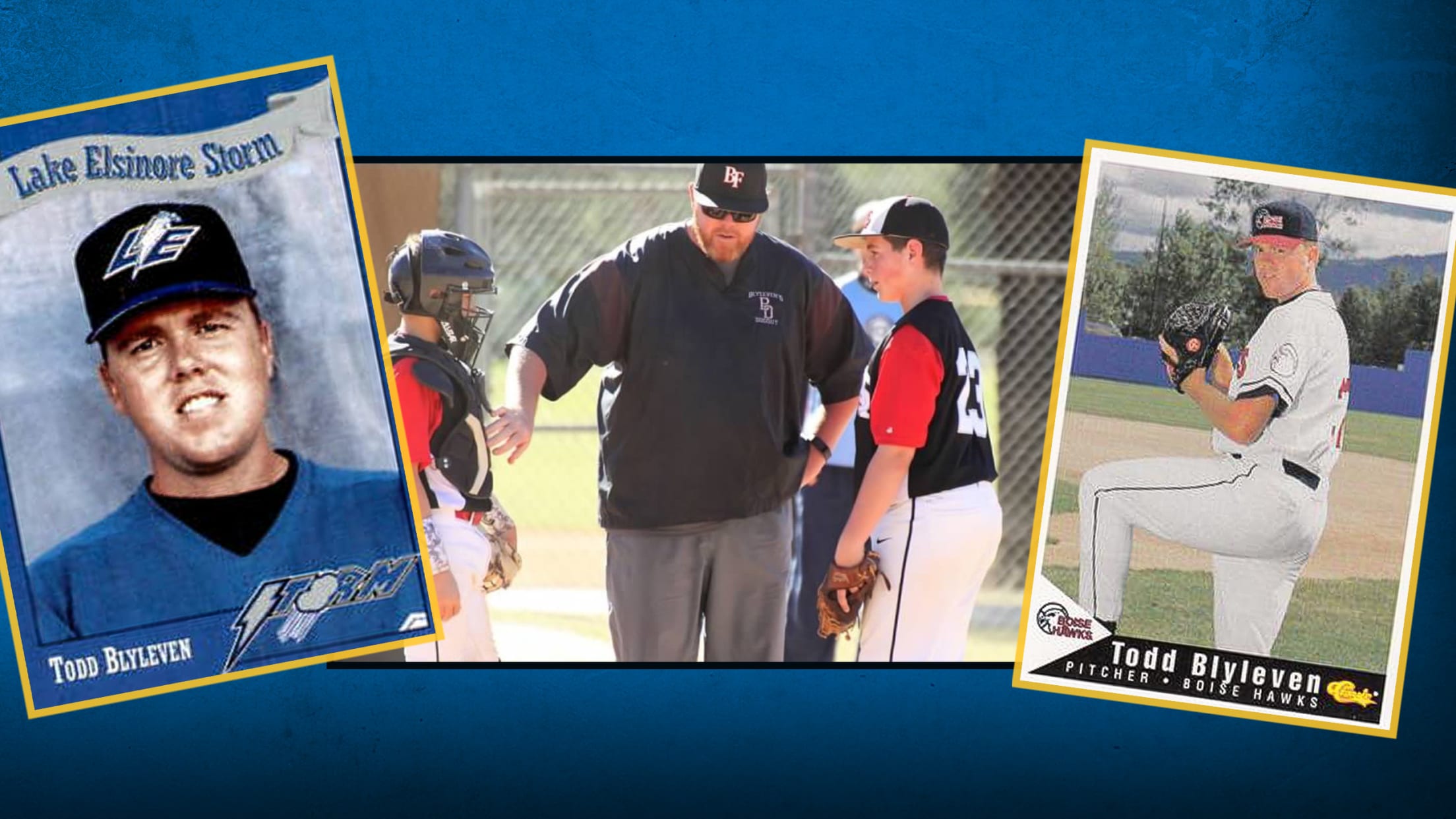
For all his doubt and difficulties in his daily life, Todd Blyleven was pretty sure about himself on a country dance floor. With a Stetson hat atop his head and Durango boots on his feet, he could swing to the music of Garth Brooks and Toby Keith with the kind of confidence he once took to the high school mound.
So one night in March 2000, Todd was dancing at the Crazy Horse Steak House & Saloon in Irvine, Calif. Cathie was there, too, all part of her plot to “run into Todd” on purpose.
Just a few weeks earlier, the two had gone on a blind date on Valentine’s Day eve. Perhaps it was the pressure of the looming Hallmark holiday that got the best of them, but the date did not go well. They had danced uncomfortably together at a country bar and awkwardly said goodbye at the end of the night. And then, for days and days, Todd didn’t call.
It was a classic case of a man and woman dancing not with each other but around each other. Cathie wondered why Todd seemed disinterested, and all the while he was wondering the same about her. But with that not-so-chance second chance, they got it right. They danced in sync. They began to fall in love.
Initially, Cathie didn’t understand why so many people gravitated toward Todd and why they always asked him about his dad.
“What do you know about baseball?” Todd asked her.
“My nephew played Little League,” she replied.
Todd explained that the baseball world -- a world Cathie had experienced only briefly in a couple stray trips to Angel Stadium as a kid -- was his dad’s world and, by extension, his own world. And though Cathie was dispassionate about the sport, listening to Todd discuss it so enthusiastically allowed her to see what he could not.
“Every time he talked about baseball,” she says, “his whole face lit up.”
Todd was so certain that he had to build a real life outside of baseball -- outside of his father’s big shadow and the pitching dreams he had fruitlessly chased as a child -- that it didn’t occur to him that he could still find a role as an adult in the boy’s game.
It was Cathie who gave him the kick in the pants to get back in the game. And that’s how Todd became a scout -- first for the Angels, then for the Rockies. His signature signing was a Long Beach State shortstop named Troy Tulowitzki, who was taken by Colorado with the seventh pick in the 2005 Draft. But his proudest moment came a few years earlier with the Angels, when his contributions on the scouting side earned him a 2002 World Series ring. He can still remember how brightly that ring shone when he was first presented with it in then-Angels general manager Bill Stoneman’s office.
The ring was one of his most prized possessions.
“As time went on,” he says, “I wore it out on special occasions and when we would dress up a little bit. I also took it out and wore it when times got tough, to help me remember that feeling I had in baseball that year and that feeling I had when I put it on the first time. It just lifted me up.”
Yet for all the light and joy baseball brought back to Todd’s life, it also cost him. He and Cathie married and had two children -- a son, Dylan, and a daughter, Gracie. The scouting demands meant long periods away from his blossoming brood. And mentally, Todd felt ill-equipped to handle the pressures of his evolving life. Suddenly, scouting itself wasn’t enough. Todd felt that he was a failure as a husband and a father if he didn’t ascend into an executive role.
“It was really challenging for me to try to figure out who I was and where I belonged,” he says. “And that translated directly into how I was as a husband, as well.”
The incongruity in Todd’s life was that, while he struggled to meet the needs of his bride, he was always eager to help strangers. Inspired by the message in that chapel service in the dugout all those years earlier, Todd was -- and is -- the type of person who pulls over to the side of the road to assist a stranded motorist. Once, in high school, while in Farmington, N.M., to play in the amateur Connie Mack World Series, he and three teammates were walking near a convenience store when they saw a truck flip over and catch fire. Todd pulled the large man behind the wheel out of the vehicle and dragged him about 20 yards to safety.
Todd was living proof of the good that can come from people pulling together. And yet, at home, he wasn’t always pulling on the same rope as his wife.
When the whole [Blyleven] family gets together, they have tons of fun, but there's just not as much emotion as I was used to in my family.
Cathie Blyleven
When Dylan was just a baby, Cathie got into a car accident that created severe anxiety issues from that day forward. Driving on the freeway would cause her to have a panic attack. Instead, she stuck to the local roads. In Los Angeles -- and, eventually, Dallas, where the Blylevens moved in 2017 -- an aversion to freeways is a complicating factor in day-to-day life. Todd focused more on the nuisance his wife’s condition caused him than on the condition itself.
He wanted a quick fix.
“Let’s just get in the truck and go talk to a doctor,” Todd would say. “Let’s get you back out there.”
She couldn’t make him understand that, for her, it wasn’t that easy.
What Todd and Cathie were experiencing was an outgrowth of their upbringing. Cathie came from a large, loud, loquacious family where people expressed themselves freely and were always empathetic. Todd came from that more hard-edged background, where you tough your way through adversity.
“When the whole [Blyleven] family gets together, they have tons of fun,” says Cathie, “but there's just not as much emotion as I was used to in my family.”
Over time, as the misunderstandings mounted and their fundamental issues went unresolved, Todd and Cathie began to feel like a mismatch. The couple that never had a single fight prior to their marriage now fought all the time. They had suffered an emotional disconnect that they could not seem to repair. Something had to change.
With things at their worst and their marriage in serious danger of dissolving, Todd and Cathie planned a trip, one last-ditch effort to rekindle what they’d lost. They picked a place where they could return to their relationship’s roots. Dancing. Country music. Unencumbered -- and unthreatened -- joy.
They bought their tickets to the Route 91 Harvest Festival in Las Vegas.
* * * * * * * *
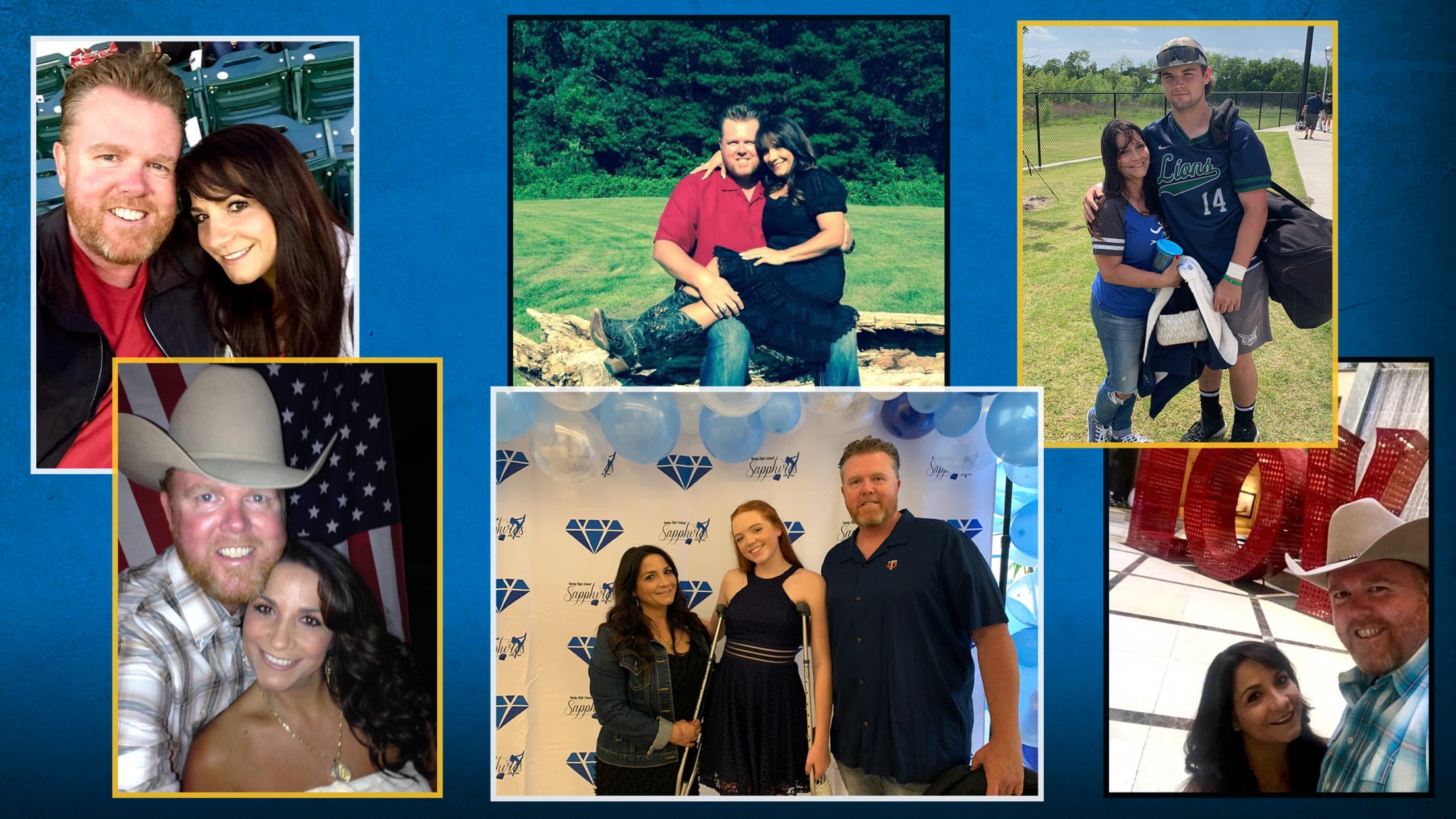
A traveling party of 18 -- Todd, Cathie and a horde of friends and extended family members -- descended upon Sin City that weekend in the fall of 2017. Things were icy enough between Todd and Cathie that they didn’t even sit next to each other on their American Airlines flight from Dallas. Years earlier, they would have gone on a trip like this huddling close and holding hands. Now, they argued via turbulent texts from their respective seats.
Todd: "I don't want to fight this weekend. I just can't stay on the same path. Everything I do seems to upset you and I know I will never be able to overcome the stupid mistakes I've made and how I ignored your anxiety issues."
Cathie: "I feel like we are just going thru the motions."
Todd: "I got married to live happily ever after and not to upset my wife and make her life a living hell. I need to better myself and its on me.”
A trip meant to be a revival was off to a rough start. But when the plane landed, peace initially prevailed. During the days, the Blylevens hit the casinos and lunched in great restaurants. At night, they’d trek over to the three-day music festival, set on an acre-long patch of asphalt in the shadows of the Mandalay Bay Resort. They had fun swinging to the songs of Eric Church, Sam Hunt and Jake Owen, laughing and drinking with their friends. And they eagerly awaited the festival’s Sunday, Oct. 1., grand finale, featuring headliner Jason Aldean.
Aldean has a song called “Any Ol’ Barstool” about a man in denial about how he’s handling a breakup:
Sure I stay ‘til they’re all long gone
And I take the long way home
But I ain’t sittin’ ‘round
Tryin’ to drown the thought of you
Ask any ol’ barstool
Those are the words Aldean was singing as Todd, dressed in a white checkered shirt and a cowboy hat and boots that were a gift from Cathie, spun and dipped his niece, Brianna, near the back of the venue. Away from the more crowded area near the stage and temporarily removed from the angst of his unsatisfied heart, Todd had the space to dance loosely and sing loudly. His wife was there, his friends were there and a joyful noise was in the air. Todd felt happy, he felt free.
That’s when he first heard the popping sounds.
“Are those fireworks?” Cathie asked.
Todd’s eyes trailed the sound back to the Mandalay Bay. And when he began to hear screams in the crowd and saw the light flashing from a room about three-quarters of the way up the 43-floor building, he knew.
“It’s gunfire!” he yelled. “Get down!”
As Aldean and his band fled the stage, Todd and his group dropped to the ground, hands covering their heads. A madman with an arsenal of 14 AR-15 and eight AR-10-type rifles, a bolt-action rifle and a revolver had opened fire on the concert crowd from his suite on the 32nd floor. Todd could hear the gunshots and the awful screams of his fellow concertgoers.
The popping noises ceased for a moment. Todd knew the shooter must be reloading. This was a chance to escape.
“We need to get out of here!” he shouted.
He spotted a line of food trucks near the edge of a venue and a Budweiser cart where they could take cover. The boy who had once sprinted alongside his dad, chasing a baseball dream, was now a 6-foot-5, 230-pound man, running for his life. With the gunfire beginning again, with the bullets striking metal and dirt and flesh, Todd’s entire group was fortunate to get out alive. They made it to the beer stand, then to a squad car parked near the exit, then to the safety of Giles Street, away from the horrors behind them.
As he ran, though, Todd spotted a man carrying a younger woman, probably 18 or 19 years old. She was lifeless. Todd ran over to help lay her body down. He grabbed her boot with one hand, her wrist with the other. And it was that brief sensation of skin to skin that reawakened the teamwork mentality instilled in Todd that day long ago, in the World Series dugout. He knew that it was not enough to get himself out, not enough to get Cathie out, not enough to get his friends and family out. He had legs and arms that worked, and he wanted to put them to work. He wanted to get others out of the line of fire.
And getting them out meant going back in.
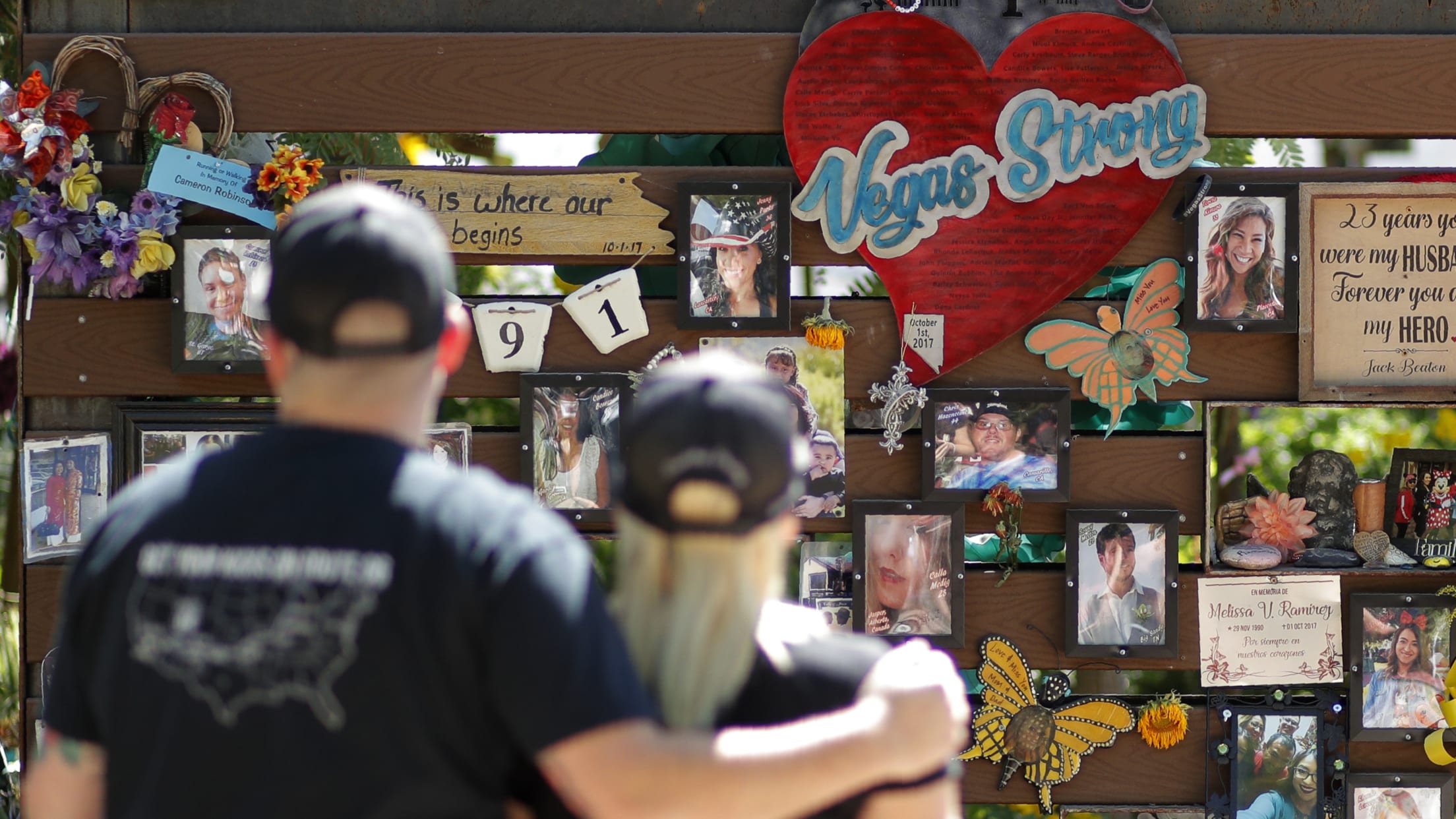
“I can’t just let these people die.”
Todd looked his wife in the eye. Like so many others who would selflessly serve others that night, he was willing to risk his life.
“I’m going back in,” he said.
Cathie was confused. But also not surprised. This was Todd’s nature, to help those in need. Some of those stops on the side of the road to assist strangers had come when he was on his way to pick her up for a date. Now, once again, there was a tacit understanding that Todd’s sense of duty was overtaking everything. He had been raised for a moment like this.
What had his father said on that hilly street in Villa Park? “There’s no stopping here.”
The moment happened so fast -- Todd kissing Cathie goodbye, then hustling back to the venue as she and the rest of their crew ran the opposite direction seeking a place to hide -- that she didn’t even have time to process what was happening. Cathie and the rest of the group found refuge thanks to a helpful stranger who let them hide out in his condo. They turned off all the lights and hid in a hallway, waiting for the terror to end. Cathie checked her phone and found it flooded with text messages and Facebook messages from Bert and other family members checking to see if she and Todd were safe. And as she began to read reports that the shooter was still active -- and what turned out to be erroneous reports that other shooters may be active in the area -- she began to let herself ponder and fear the worst.
“Please,” she prayed. “Please just get inside.”
Back at the venue, with the bullets still raining, Todd ventured into a sequence of events he would later piece together in therapy and share in media accounts. He crossed the threshold and found an elderly woman who had been shot in a lower extremity. He carried her out and set her near a squad car where a nurse had begun to set up a makeshift triage unit. Then he found a younger woman who had been shot twice, laying near the beer cart where he and his group had once cowered. He alerted another nurse to her. He found a wounded young woman whose friends were struggling to get her off the ground. He lifted her up and carried her outside to a car that could take her to the hospital.
Todd returned again to the concert site and came across a large group of people -- maybe 75 to 100, in his estimation -- taking cover behind some folding chairs. They didn’t realize that an exit sat just beyond the nearby food vending trucks. Like a third-base coach waving a runner home, Todd planted his feet on the ground, pointed one arm toward the exit to his left and circled the other.
“Let’s go! Let’s go!” he yelled.
The shots were now closer than ever, clanging off a metal structure just to Todd’s right. For that moment, Todd and the killer were in direct conflict -- the shooter trying to take those lives, Todd trying to save them.
They survived, and so did Todd.
Though the shooting finally stopped soon thereafter, Todd kept going, running from body to body, checking pulses and carrying who he could. When he set one woman down outside, he looked in her eyes and realized she was gone. He had his right hand upon her, and he saw his shiny, gaudy World Series ring staring back at him. It didn’t feel right. That achievement that had once meant so much to him now felt so hollow and disrespectful.
He turned the ring inward and went back to work.
Hours after the shooting stopped, Todd continued doing his part among a horde of helpers tending to those in need. At one point, he set a person down at an ambulance, and someone standing behind him spoke up.
“OK,” the man said, “where we going next?”
Todd turned to find an off-duty EMT, who had been following his path.
“You’ve been carrying them out,” the man explained, “and we’ve been fixing them up.”
As night turned to early morning, Todd joined a group of medics outside the nearby Tropicana hotel as injured people continued to be placed in ambulances that had lined up like Ubers at an airport. Suddenly, word spread of an active shooter on the roof of the Tropicana, and hundreds of scared souls scrambled inside. It turned out to be a false alarm, but nobody had any way of knowing that as they scattered and looked for cover.
That’s about when the enormity of everything he had just been through -- the shocking sounds of shooting, the rushed goodbye to Cathie, the sprints in and out of the concert venue, the lugging of bodies, the vacant stares of the dead, and now this episode at the Tropicana -- finally caught up to Todd. With his head pounding, he asked a SWAT team member to stand watch outside a bathroom. There, washing his hands and looking in the mirror at the blood now covering his shoulders, hat and shirt -- the blood of the victims of Route 91 -- he broke down.
“All I wanted to do from that time,” he says now, “was get back to my wife. I needed that softness, I needed that hug, I needed to kiss, I needed to know that this is not normal and that everything’s gonna be fine.”
With what little battery power remained on his phone, he contacted Cathie, who was still holed up in the condo at the Desert Rose Resort, mere steps from Todd’s location. Once the authorities gave the clearance for people to leave the Tropicana, Todd headed in the direction of his wife, and she him. They met near the Desert Rose lobby, where they kissed and embraced and, with that healing reunion, took a first step toward putting their many marital troubles behind them.
It was 6:30 a.m. Todd, Cathie and all the survivors of the Las Vegas shooting ventured into the first day of their permanently altered lives.
* * * * * * * *
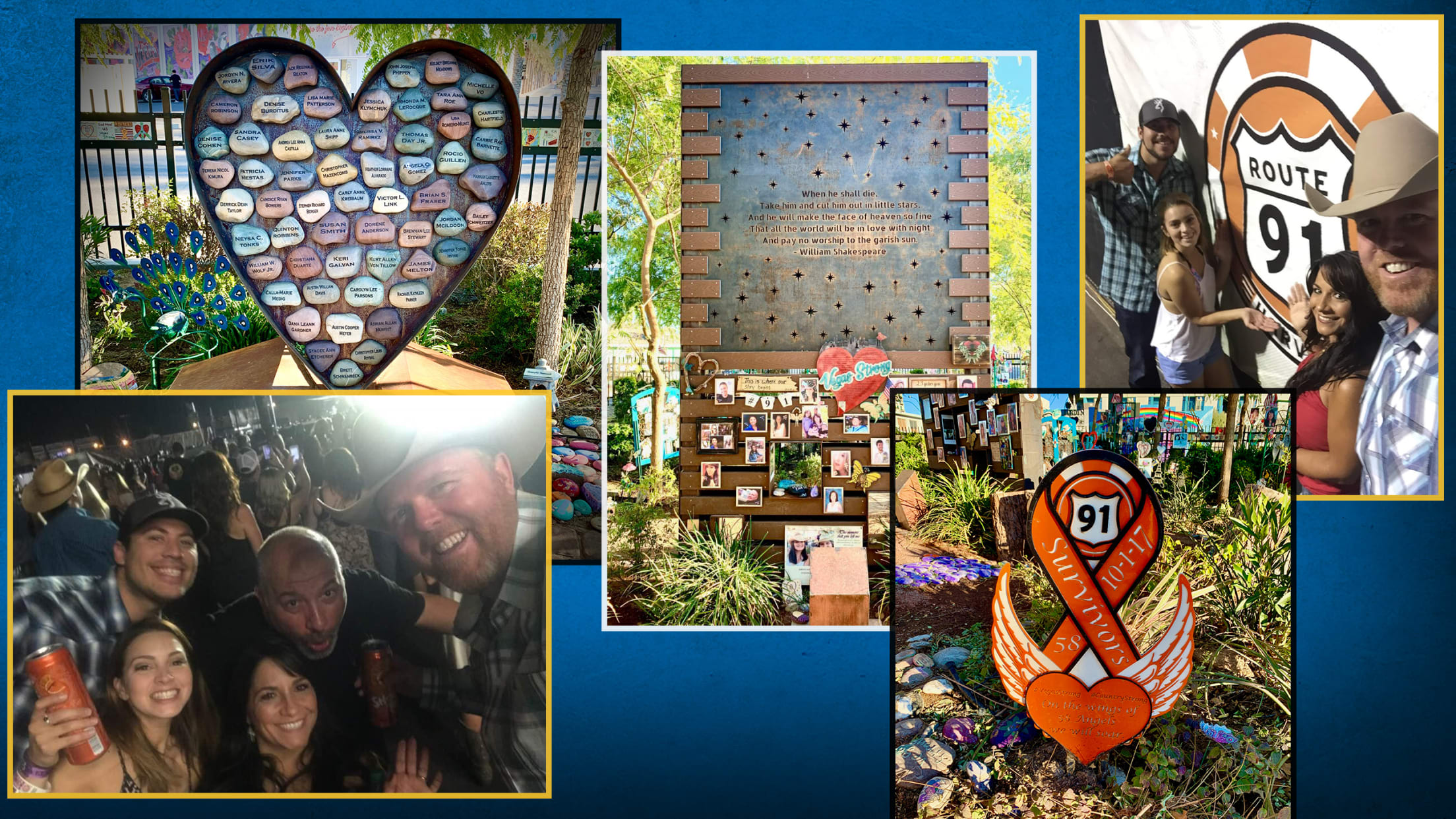
“When do you think you’re going to get over this?”
Bert Blyleven’s question to his son in the aftermath of Route 91 was aligned not just with his own experience of toughing his way through elbow and shoulder pain to win 287 games in the big leagues but with our cultural expectation of perseverance through pain. We will ourselves past the arduousness, past the evil, past the unexpected. We celebrate strength and power.
We get over things.
Bert figured the same son tough enough to quietly nurse a broken arm in the Pirates’ clubhouse would eventually shake off this experience, too. The night of the shooting, Bert had received a call from his daughter, Kim, alerting him to what was happening at the concert Todd and Cathie were attending. When he had gotten ahold of Cathie and was told that Todd had gone back in the venue, he, too, was concerned but unsurprised.
“He was always that way,” Bert says. “I think, if he wasn’t taught to play baseball, he would have been a policeman, maybe a fireman. He would have done something to help others.”
Bert and his wife, Gayle, had traveled to Dallas soon after the shooting to spend time with Todd, Cathie and the kids. The Hall of Famer listened intently as his son detailed his experience. Then he hit him with that question posed with typical Dutch directness.
“When do you think you’re going to get over this?”
Todd looked his father, his idol, in the eye.
“Dad,” he said, “this isn’t something you just get over.”
The Las Vegas shooting had one villain, 58 victims fatally wounded that night, two more who eventually died from complications related to the shooting in the ensuing years, 411 people injured by the bullets, another 456 injured in the ensuing panic, and some untold number of heroes. Beyond the actions of law enforcement and medical personnel were the ordinary concert attendees who cared for the wounded, led others to safety, performed CPR, made tourniquets, and drove victims to the hospital. Others are heroes in the aftermath for the graceful way they have navigated this cruel life experience, for the way they keep contributing positively to a world that let them down.
Todd Blyleven is far from the only citizen who risked his life to assist others that night. You are reading his story because he is the son of Hall of Famer Bert Blyleven, and with that profile comes the recognition of what he risked.
When Todd and Cathie returned home the day after Route 91, their first stop was their son Dylan’s baseball game, where they wrapped their two children in a bear hug amid onlookers who, from Vegas news reports and word of mouth, knew what the Blylevens had just been through. But that was only a small first step toward healing. Nearly four years later, Todd is still processing what happened in Vegas and its effects on his life.
It took him a good six months or so -- six months of headaches, six months in which he bottled up the goriest details of his experience -- before he committed to getting therapy to help him move forward. Through eye movement desensitization and reprocessing (EMDR), he has been able to piece together the events of a night that had felt like a blur in its immediate aftermath.
“If that whole thing is a movie, it starts to put those minute-long segments back in order for you over time,” Todd says of his therapy. “It allows me to process the good parts and the bad parts and to lean more on the goodness of things -- the love, people coming out to help, the selfless acts, being back with my wife -- and really appreciate where I’m at today.”
Todd has also found it helpful to connect with other victims. Five months after the shooting, on a Facebook group for Route 91 survivors, a woman had posted in search of the man who had helped carry her friend out of the venue and into a car on Giles Street. Todd’s friends tagged him in the post, thinking he might be the guy, and private messaging confirmed he was.
Whether you ran back in or you ran out or you ran away, there was no right or wrong. But you know, it goes to show that people who aren't first responders for a living can act in such a way. It really does show me that there are some good people in the world.
Sayeh Khan
That’s when Todd learned that the woman he had carried -- Rachael Parker, a records technician for the Manhattan Beach Police Department -- had passed away in the hospital the morning after the shooting. She was just 33 years old.
Rachael had attended the Route 91 concert with two coworkers. One of the women, Sayeh Kahn, remembers Rachael as a selfless, spirited soul who loaned her money for college after her mother died. Sayeh had joked that Rachael was her ”legal guardian.” Losing her, so soon after losing her mom, cut Sayeh deep. And the pain still lingers. But connecting with the man who had lifted Rachael out of the Vegas venue, allowing her to die with dignity in the hospital and not on the ground, was meaningful to Sayeh. When Todd and his family visited California in the summer of 2018, Sayeh and the other friend (who asked not to be named) were able to meet him in person. They’ve remained in touch in the years since.
“There was no right or wrong on how people responded that night,” Sayeh says. “Whether you ran back in or you ran out or you ran away, there was no right or wrong. But you know, it goes to show that people who aren't first responders for a living can act in such a way. It really does show me that there are some good people in the world.”
Running back in came with a cost. As a result of carrying all those bodies, Todd needed surgeries to repair tears in his left labrum, bicep and rotator cuff and to address a hernia in his right groin area. His left hip still gives him trouble. And every time he talks about Vegas and revisits those memories, he knows he’ll have some restless nights. PTSD is a part of his life now and always will be. When Todd and Cathie go out to eat, they find a table where they can position their backs against a wall and where they have a view of the entire restaurant. It makes them feel just a little less vulnerable.
As for the 2002 World Series ring -- a symbol of achievement that now carries a different connotation -- Todd tucked it away in a drawer.
“I don’t know if I will ever wear it again,” he says. “But I know it’s there.”
That first night at home, Todd had a dream about the Vegas shooting so vivid that it caused him to scream aloud and grab Cathie’s leg, waking both of them. In the dream, he was running and could hear the cries of the victims, could smell the gunpowder, could feel the tracer bullets whizzing past his sides. He followed the sound of a man crying for help as a white light appeared and a massive angel wrapped Todd in its wings, with the bullets bouncing harmlessly off its back.
Todd interpreted that dream to mean he is not alone, that some higher power protected him and allowed him to get back safely to his wife and kids. The dream inspired him to design a large tattoo for his right arm. It depicts the angel wings and a cross and references Psalm 91:11 (“for he will command his angels concerning you, to guard you in all your ways”), Route 91, the date of the shooting and the message “Country Strong.” It has five stars -- one for Cathie, two for the nurses Todd had worked closely with that night, one for the EMT that had followed him from body to body and the fifth for the many victims of the massacre.
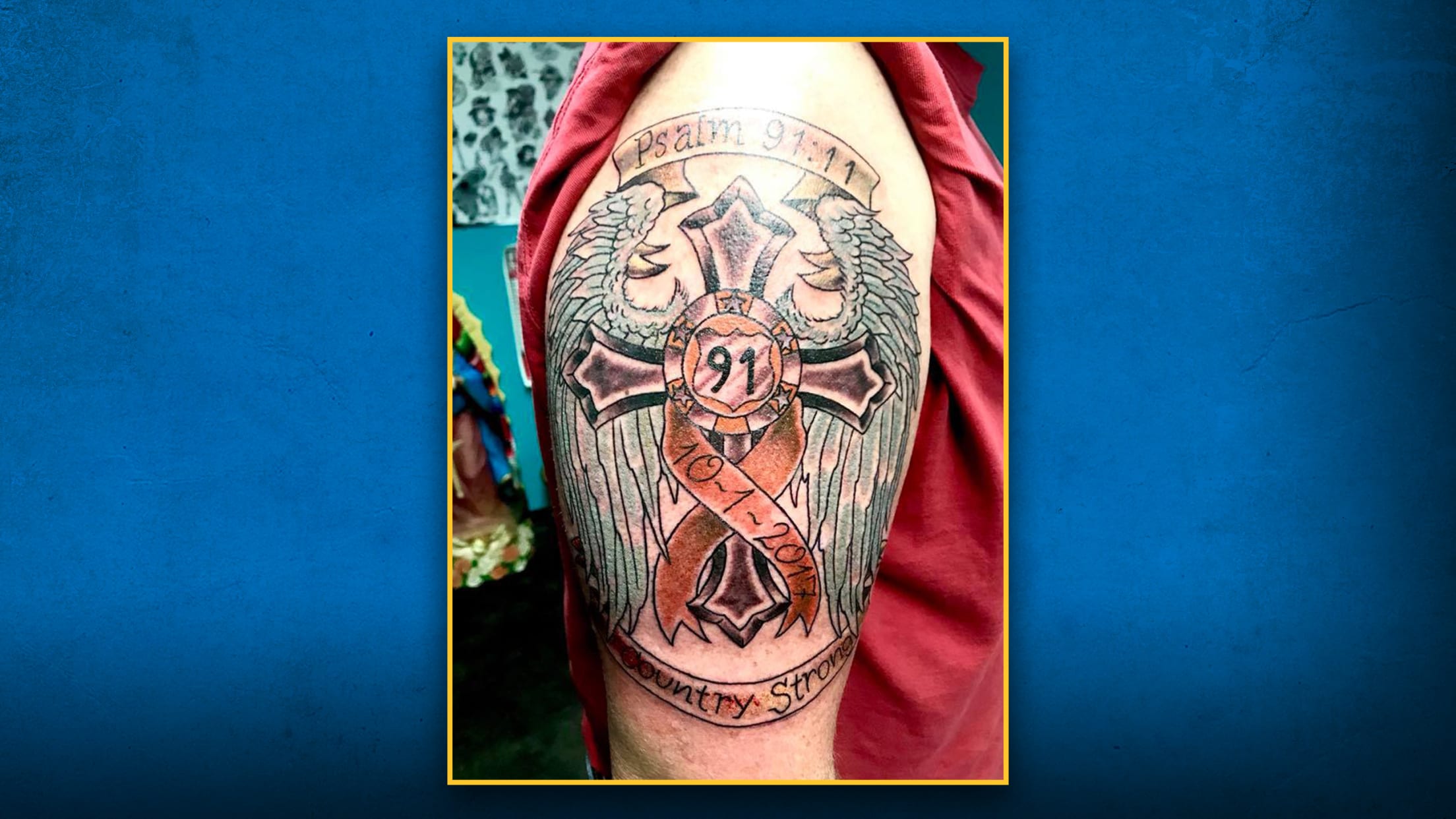
The tattoo is testament to how the Vegas shooting has deepened Todd’s faith. The experience has also motivated him to be a more sensitive and attentive husband.
“What I've learned now, in dealing with my own anxiety, is that it's not something you just get over,” Todd says. “And that goes [for anyone who] experiences a traumatic event. We have to be more caring and empathetic to their feelings, what they went through. They went through something that's not normal. For me to just expect my beautiful wife to just get over [her driving anxiety] because it's a burden on me and maybe I have to drive the kids to their games or whatever? Who cares? She’s going through her own stuff.”
The relationship between Todd and Bert has changed, too. It’s softer now. It’s not all about baseball and business.
When Todd told Bert that an experience like Vegas doesn’t just fade into the background, Bert was quiet for a moment. Then he looked his son in the eye.
“What you did is incredible,” Bert said. “And I’m proud of you.”
That affirmation from the man he admired meant a great deal to Todd. On a baseball field, he had failed to meet the expectations that came with his last name. But in that field in Vegas, he had made an impact, and in doing so, he unlocked something inside himself.
Today, at 48, Todd works in sports technology. But after obsessing and fretting all those years about his role in life, he’s learned that his profession is secondary to the impact he can have on his family and on this world by listening to others, by helping others and by respecting how short and precious life is.
Earlier this year, Todd and Cathie returned to Vegas for the first time since Route 91. They went to the community healing garden arranged in downtown Las Vegas in the aftermath. There, Todd found the names of those who had died in his arms.
“They didn’t die on the turf,” he says. “They died with somebody trying to help them. That doesn’t make it better. At all. But the families should know that …man … there was so much love trying to get them out and save their life. Not just by me but by all of those people."

